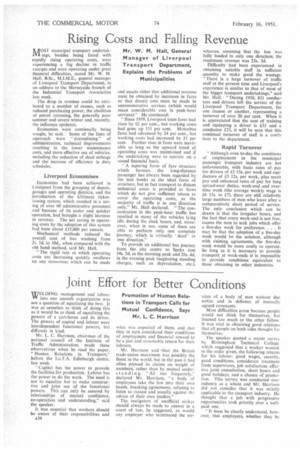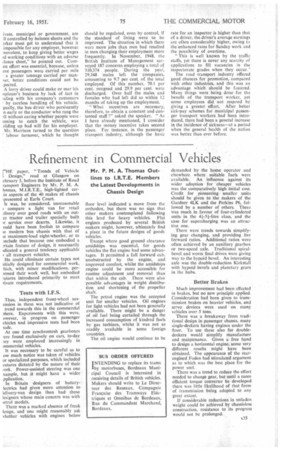joint Effort for Better Conditions
Page 52

Page 53

If you've noticed an error in this article please click here to report it so we can fix it.
Promotion of Human Relations in Transport Calls for Mutual Confidence, Says Mr. L. C. Harrison WELDING management and labour TV into one smooth organization was not a question of equalizing the two. It was as senseless to think of doing this as it would be to think of equalizing the powers of a cart-horse and its driver. The powers of capital and labour were interdependent functional powers, but different in kind.
Mr. L. C. Harrison, chairman of the national council of the Institute of Traffic Administration, made these observations when he read his paper, " Human Relations in Transport," before the Lo.T.A. Edinburgh centre. last week.
"Capital has the power to provide the facilities for production. Labour has the power to do the work. The need is not to equalize but to make constructive and joint use of the functional powers. This can only be assured by relationships of mutual confidence, co-operation and understanding," said the speaker.
It was essential that workers should be aware of their responsibilities and A34
what was expected of them, and that they in turn considered their conditions of employment and financial reward to be a just and reasonable return for their labours.
Mr. Harrison said that the British trade-union movement was possibly the finest in the world, but in the past it had often pressed its claims on weight of numbers, rather than by mutual understandin g. "All too frequently,declared Mr. Harrison, "a body of employees take the law into their own hands, breaking agreements, refusing to listen to reason and usually against thc advice of their own leaders."
The instigators of unofficial strikes should always be made to answer in a court of law, he suggested, as would any employer who terminated the ser
vices of a body of men without due notice and in defiance of mutually agreed covenants.
Most difficulties arose because people would not think for themselves, but listened too much to the other fellow. It was vital in obtaining good relations that alt people on both sides thought for themselves.
The speaker quoted a recent survey by Birmingham Technical College which suggested that a worker wanted. in the order given, the following returns for his labour: good wages, security, good conditions, considerate treatment from supervisors, job satisfaction, effective joint consultation, short hours and good holidays, and a chance of promotion. This survey was conducted over industry as a whole and Mr. Harrison did not consider that it was strictly applicable to the transport industry. He thought that a job with progressive opportunities took priority over a wellpaid one.
"It must be clearly understood, however, that employers, whether they be
ivate, municipal or government, are II controlled by balance sheets and the arker must get to understand that it impossible for any employer, however :nevolent, to keep giving better wages id working conditions with an adverse dance sheet," he pointed out. Conlon effort was essential, because, unless ore passengers were carried per mile a greater tonnage carriedper manmr, better conditions could not be .pected.
A lorry driver could make or mar his nployer's business by lack of tact in :aling with his company's customers ' by careless handling of his vehicle. aually, the bus driver who persistently n early or the conductor who rang the ll without caring whether people were inning to catch the vehicle, was Aiding up bad will for his employer. Mr. Harrison turned to the question ' labour turnover, which he thought
should be regulated, even by control, if the standard of living were to be improved. The situation in which there were more jobs than men had resulted in men changing their employment more frequently. In November, 1948, the British Institute of Management surveyed 187 concerns employing a total of 310,374 people. During the year, 29,348 males left the companies, amounting to 9.7 per cent. of the total employed. Of this number, 70.1 per cent. resigned and 29.9 per cent, were discharged. Over half the males and females who had left did so within 12 months of taking up the employment.
"What incentives are necessary, therefore, to obtain a constant and contented staff ?" asked the speaker. "As I have already mentioned, I consider that the money incentive takes second place. For instance, in the passenger transport industry, although the basic rate for an inspector is higher than that of a driver, the driver's average earnings are often considerably higher, owing to the enhanced rates for Sunday work and the possibility of overtime.
"This is well known by the traffic staffs, yet there is never any scarcity of applications to fill vacancies in the inspectorate grades when they occur.'
The road transport industry offered good chances for promotion, compared with other industries, and this was an advantage which should be fostered. Many things were being done for the benefit of the transport worker, yet some employees did not respond by giving a greater effort. After better sick-pay schemes for municipal passenger transport workers had been introduced, there had been a general increase in the incidence of sickness—at a period when the general health of the nation was better than ever before.




















































































